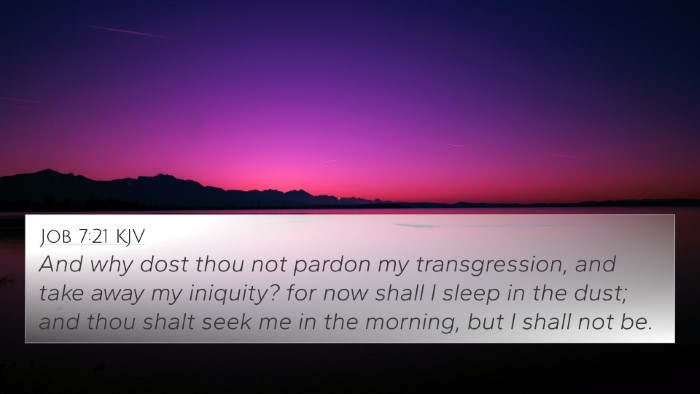Understanding Psalms 69:17
Psalms 69:17 states: "Hide not thy face from thy servant; for I am in trouble: hear me speedily." This verse encapsulates a profound plea for divine presence and assistance amid distress.
Summary of Meaning
The psalmist, traditionally attributed to David, expresses urgent need for God’s attention during troubled times. The request involves both a desire for God to "hide not" His face—signifying His favor and attention—and an urgent call for speedy assistance, reflecting the depth of despair and vulnerability felt.
Thematic Connections
This verse resonates with themes found throughout the Psalms and the broader biblical narrative. It highlights human vulnerability and the need for divine intervention, encouraging readers to seek God's presence in times of distress.
Cross-References
- Psalms 22:24 - "For he hath not despised nor abhorred the affliction of the afflicted; neither hath he hid his face from him." This verse reassures that God sees the afflicted.
- Psalms 31:22 - "For I said in my haste, I am cut off from before thine eyes: nevertheless thou heardest the voice of my supplications when I cried unto thee." This reflects a similar plea for God's attention during trouble.
- Psalms 142:6 - "Attend unto my cry; for I am brought very low: deliver me from my persecutors; for they are stronger than I." This emphasizes the theme of calling on God in dire circumstances.
- Isaiah 54:8 - "In a little wrath I hid my face from thee for a moment; but with everlasting kindness will I have mercy on thee." This verse echoes the desire for God's presence.
- 1 Peter 5:7 - "Casting all your care upon him; for he careth for you." This New Testament verse provides assurance of God’s attention to our needs.
- Matthew 14:30 - Reflecting Peter’s experience, "But when he saw the wind boisterous, he was afraid; and beginning to sink, he cried, saying, Lord, save me." This shows a cry for help in sinking circumstances.
- Romans 10:13 - "For whosoever shall call upon the name of the Lord shall be saved." This emphasizes the assurance of answering distress cries.
- Philippians 4:6-7 - "Be careful for nothing; but in every thing by prayer and supplication with thanksgiving let your requests be made known unto God." This encourages believers to seek God in prayer.
- Hebrews 4:15-16 - "For we have not an high priest which cannot be touched with the feeling of our infirmities." This speaks to Jesus’ empathy in our struggles.
- Psalms 119:153 - "Consider mine affliction, and deliver me; for I do not forget thy law." Here, the plea for consideration relates to the cry in Psalms 69:17.
Detailed Exegesis
When analyzing Psalms 69:17, several layers of interpretation emerge:
- Desperation for Divine Attention: The psalmist’s cry reflects a universal human experience of feeling abandoned in crises.
- The Importance of God’s Presence: Hiding one’s face can denote rejection or absence; therefore, the request is one of seeking reassurance and comfort in God's presence.
- Urgency in Prayer: The term "hear me speedily" emphasizes a deep sense of urgency, suggesting that in emergencies, one often feels an intensified need for immediate response.
- Implied Hope: Despite the distress, the very act of calling out signifies hope and faith in God’s willingness to hear and respond.
Links to Broader Biblical Themes
In connecting Psalms 69:17 to other scriptures, we find numerous themes that encapsulate human struggles and God’s faithfulness. This verse can be linked to the overarching biblical theme of God's desire to be near to His people during their trials.
Related Themes in Scripture
- The Cry for Help: Verses across the Psalms demonstrate the importance of crying out to God in distress, highlighting a common biblical pattern of dependency on divine rescue.
- Faithfulness in Trials: Many stories, from Job’s suffering to Jesus in Gethsemane, reflect the struggle and the prayerful cries for divine help.
- The Role of Prayer: The consistent biblical narrative encourages believers to persist in prayer, as seen in both the Old and New Testaments.
Comparative Bible Verse Analysis
By examining Psalms 69:17 in light of other scriptural passages, we can observe the shared human experiences of distress, the need for God’s attention, and the urgency of prayer:
- Old Testament Context: Similar sentiments are found in the laments of Job and the cries of Israel during times of distress.
- New Testament Fulfillment: The cries of the New Testament often highlight Jesus’ empathic responses to human struggles.
Tools for Bible Cross-Referencing
For those engaged in deeper biblical study, various resources assist in identifying connections between verses:
- Bible Concordance: A tool for finding verse locations related to specific keywords.
- Bible Cross-Reference Guide: A structured approach to see thematic links across passages.
- Comprehensive Bible Cross-Reference Materials: These resources provide an extensive network of interconnected Bible verses.
Conclusion
Psalms 69:17 serves as a poignant reminder of our need for God’s presence in challenging times. It encourages a heart of prayer and a reliance on God’s responsiveness to our pleas, echoing sentiments found throughout Scripture and affirming the importance of intercessory prayer.















